Joshua M. Casey's Blog
June 15, 2021
Steve
It‘a been just over a week since I was informed of the passing of my dear friend, Steve Austin.
The intervening time has included a flood of tears, and then emptiness; a wondering of why I felt . . . blocked . . . from being able to grieve as I felt I ought. It has included guilt and questioning of my own friendship and commitment to the care of a person who made everyone he met feel as though they were the only thing that mattered.
It’s included hours of thought on the meaninglessness of life and death—that none of us are getting out of here alive, and that “death with dignity” is for the living.
I wondered at my own complete lack of interest in reaching out to the Beyond, to praying or asking some Divine source for answers or hope or protection. I wondered at this indifference and, if I felt any spiritual nostalgia, it was for the numbing effect that former practices such as church and prayer—and the false hope of knowledge about things unknowable—would have offered.
Lastly, this time has included fear for my own long history of self-harm ideation and the knowledge that no one ever “just gets over it.” For the knowledge that, no matter how loving or caring or cared for I am, there is a depth to depression that cannot be known or communed with, as the Jewish wisdom tradition says, “The heart knows its own bitterness, and no stranger shares its joy.”
Anyway, last Thursday, I was invited by my friends on the Inglorious Pasterds Podcast to share in a night remembering Steve. You can listen to the episode here. My friend (and DCH Pod co-host), Lucas, played a heartbreaking song he wrote, and I shared a half-baked piece? poem? thing. You can read it here:
It’s the pause, the frozen silence, when the power goes out and all are suspended in sudden, deaf darkness.
First, there is Disbelief—surely it’s a mistake.
Then, Flailing conviction—it’ll come right back.
What happens next depends on your forethought: where is the flashlight? The candles? Matches? Any source of illumination to cut through the void.
Perhaps you sit in the stillness, immobilized by the loss of a light you had not truly considered extinguishable.
And now you find that some flames do not reignite, and you are left in the darkness, its immensities having swallowed you whole—a leviathan out of whom no psalms may be heard.
My friend was incandescent, effulgent; The alchemy of the incarnation he so desperately sought to embody— bathed in mess and holiness.
And he is gone.
A dynamo, willing hope into existence where despair had sought to live; crafting charity from the ragged edges of suffering souls.
Joy issuing from deep reservoirs behind eyes that have seen the Best and worst of one’s self and the world, and passed through both.
His flame burnt brightly, dispersing gloom, warming wounded hearts in a world grown chill, but it is gone.
To whom do I apply to make sense of this loss? What God will speak to me from the whirlwind?
Give me not your platitudes, your promises of the hereafter: senseless words from blind men, whistling fairytales in the dark.
I wish not for the cold ecstasies of heaven, but The warmth of a companion’s embrace; eyes crinkled in delight or shared grief
Give me back my friend, or else let a little of his light pass on to me. Then perhaps I may find the strength of will too offer it to others.
March 28, 2021
Why We Can’t Reform The Church, 2: Definitions
I mentioned in the previous post that the springboard for these discussions would be the new direction of the collective known as The Liturgists, specifically as they pursue a more direct reformation of the church. I’m neither able nor interested in taking down this group in any way, but public initiatives and philosophies deserve public critique, however unknown the critic may be.
Again, to be clear, I have no real issue with the group, and Michael Gungor doesn’t (nor should he) care what some rando from the peanut gallery thinks of his work. I don’t think the Liturgists are in some way bad for wanting to reform the church and, despite my admittedly cynical first response, I don’t think this is some attempt at regaining any lost popularity.
They’re just wrong.
Now, apparently there has been some issue taken with stating this as the group’s intended goal.
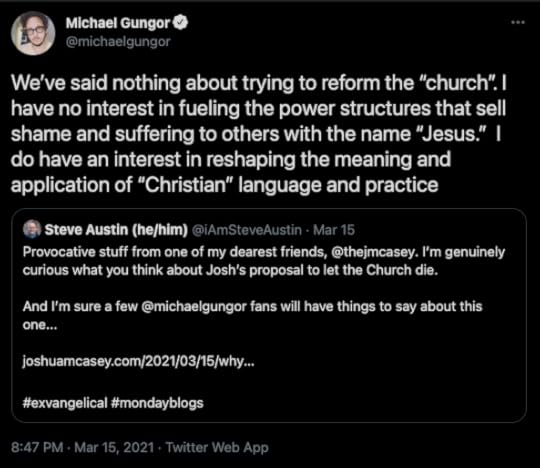
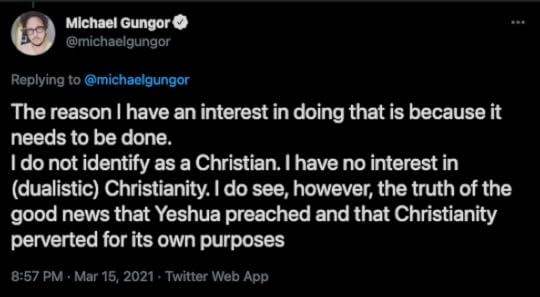
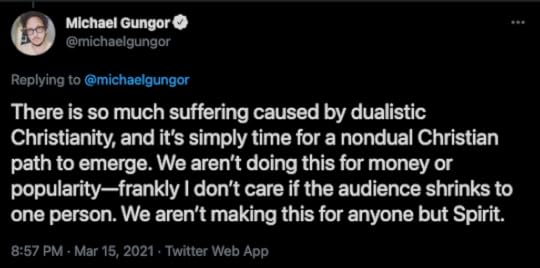
Yet if that’s the case, then there has been a confusion with, well, words.
In the written description (and content) of their second episode in this new endeavor, The Liturgists Podcast sets out to emphatically “make a case for what we think needs to continue to be reformed and reframed within Christendom.”
They go on to discuss their starting point for this project: essentially, that Christianity (or, as is often said in these episodes, Christendom—and yes, there is a difference, and yes, we’re getting there) is “the water we swim in,” and so we ought to, in essence, clean it—adding in a filter, replacing the nasty rocks at the bottom, and updating to decor, and, yeah, this metaphor has been exhausted.
 Tim Regan via Flikr
Tim Regan via FlikrI feel kinship toward the pursuit of reformation, whether the reformer is specifically calling out the institution’s systemic injustices by nailing ninety-five theses to a cathedral door, or trying split hairs by “reshaping the meaning and application of ‘Christian’ language and practice.” I feel this kinship because, as I’ll cover in later posts, I spent the better part of a decade attempting reform from within the institution in a professional context.
I would love to discuss why, through study, contemplation, and experience, I find this particular goal not only wrong, but anti-Christ; but first it seems we need to work on some definitions, because, despite every protestation to the opposite, the Liturgists and others like them, do in fact want to reform the church.
Words are important. The terms with which we define our goals locate the debate and determine its scope. So, when people explain themselves as setting out to “reform and reframe” things “within Christendom,” they are locating the aims of their movement squarely inside the institution of the church and limiting its scope to predetermined, institutional boundaries.
Now, all of this may seem way beside the point; nothing more than rhetorical throat clearing and fussiness, but it’s not. I want to move beyond their small collective to the larger issues of historical import, but there are some key points hidden here that can set up my desired discussion of why, if the church wishes to best embody its founder, it needs not to be reformed, but to die. So I’ll persist in the persnicketiness.
If this quote was an off-handed comment within a much longer discussion ranging far beyond those words, then I would be in error. But the fact is, the word Christendom is used several times in those opening episodes and, again, the actual written episode description. So, on to what I hope to be mercifully short thoughts.
First and very much foremost, Christendom is an incredibly loaded term that I am honestly surprised they used. When locating their debate, they could’ve simply chosen “the Church,” or “the faith,” but instead went with a term directly linked to temporal power, imperialism, and enforced creedal profession. Strange place to begin if one does not care about “trying to reform the ‘church’.” Or, has “no interest in fueling the power structures that sell shame and suffering to others with the name ‘Jesus.’” However, such misnomers (often accidental, occasionally the result of purposeful obfuscation) are endemic to the history of reformation.
I completely understand wanting to separate one’s work from an institution whose fruit has been, at best, a mixed bag—but if you want separation from a harmful institution, you may want to use language less steeped directly in its forceful expansion. To be sure, Christendom can mean simply “the church” across space and time, but as far as loaded words go, this one bears the weight of literally thousands of years of misuse, so the choice and consistent use of it has to be, I believe, purposeful. In which case, do these and other would-be reformers truly hope (despite tweets to the contrary) to change this bloated, perpetually self-mutilating institution from within by reframing its language and practice and seeking what they refer to as a “non-dual” path?1 If not, then where in the hell do they propose to enact these changes? And if so, let’s look at what could result.
The worst-case scenario is a repeat of the Emerging/Emergent Church: a failed aughts crusade resulting in virtually nothing more than candles and better coffee.2 The absolute best-case scenario, however, is the creation of a contemplative protest movement within the larger system, a la the Ancient’s desert mothers and fathers, the Middle Ages’ Franciscans, or, to a lesser extent, the modern Taizé community; not a bad result, but one that falls far short of its stated goal.
Again, if this shrinking collective can, through their podcasts and symposiums manage to carve out a lasting place within the walls of the church—excuse me, Christendom—that provides a refuge for the disaffected and marginalized who still feel a deep desire to gather in structured environments of Jesus-based worship, then bully for them. I just find their goals a bit too pedestrian—I’m after something a bit more . . . total.
What I desire is nothing short of the total disintegration of the entire institution—for the church to die. Only then do I believe it can arise after the image of its founder.
So let’s move on, shall we?
1. To be clear, Christianity could very well do with some more non-duality. Thankfully, there are many examples of such communities and thinkers throughout its history.
2. I’m at least half joking. We have much thanks to offer the EC’s leaders in helping move the needle of American Christianity around LGBTQIA affirmation, women in leadership, and various theological issues surrounding “atonement,” shame/guilt, and the social-political nature of Jesus’ message. I’ll spend more time with this movement later.
March 15, 2021
Why We Can’t Reform the Church
“In case you’re wondering why Gungor is going back to Christianity . . .” the text began, followed by two screenshots: one showed Michael and Lisa Gungor together on their Spotify band page, with 187,836 monthly listeners circled; following this was another screen shot of Michael’s solo page, “Weiwu” . . . 770 monthly listeners.
I admit, my first reaction was a purely cynical laugh about needing “likes,” follwed by a tinge of disappointment—even if I found Michael’s oracular tweets annoying, I still hoped he wouldn’t go back.
Soon, though, my heart softened toward this artist to whom I owe so much. After all, Gungor’s music, along with a few others’, quite literally harmonized with several years of mine and several friends’ faith journeys.1
Over the next weeks, I overheard more discussion of The Liturgists’ most recent contributor shake-up, which accompanied a move by the lone remaining founder, Michael Gungor, toward directly attempting to “reform” Christianity. Curious what he actually meant, I did something I had not in a few years: I actually downloaded and listened to their recent podcasts.
The first two episodes of Season 7, “Is Christianity Worth Saving?” and “Reformation,” set out what Michael and his new cast of rotating co-hosts are intending to do and, more importantly, why. Shortly after announcing this new project, the following two images appeared on their Facebook page:
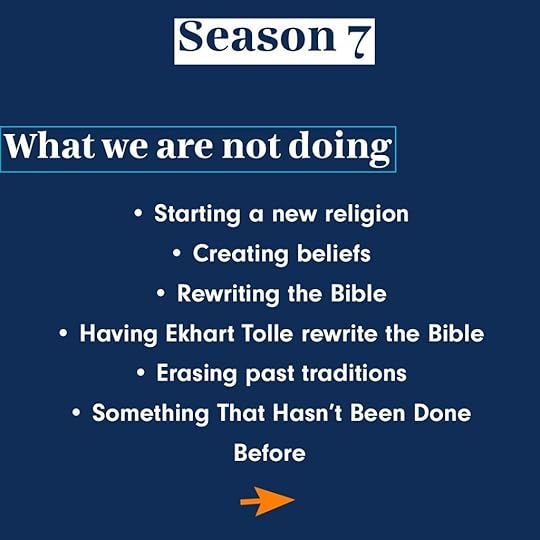
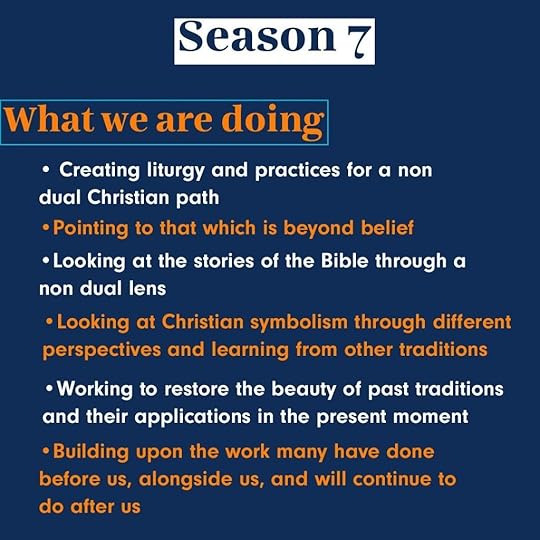
On the one hand, I totally get it. Those seem like admirable goals. I pursued them myself for many years.
On the other, I think it’s completely wrongheaded and destined to end in nothing, disaster, or a coffee shop.2
Beginning with this post, I would like to propose a different project: one that I am hoping will start a broader conversation, particularly among the generations currently inheriting cultural leadership. I also hope to develop this into a larger work; one that, like my first book, will bring in stories historical and personal, and will offer data-based diagnoses on the actual state and future of Christianity in America.
So what is this project? Well, it’s actually quite simple:
Let the church die.
You read that right. I am not advocating that we reform, restore, or emerge. I’m not suggesting we add in candles and LGBTQIA pastors, and I’m for damn sure not suggesting we improve our music or coffee.
No, I’m suggesting that, for the love of God, we take leave of god’s institution.3
I’m suggesting that the church is utterly, irreparably, fucked; that we have so thoroughly and consistently betrayed the simplicity of Christ’s call—and have done so from the moment he shuffled off this mortal coil—that the only path for the church to be what it ought is to follow its Founder’s example and, well, die. What comes next is up to the Deeper Magic from before the dawn of time.
So, to close this opening post, I want to share the general direction of this series, and then follow The Liturgists’ example, sharing “what I’m doing” and, perhaps more importantly, “what I’m not doing.”
Initially, I intend to converse with the Liturgists’ points directly, for two reasons: first, I have great respect for their past work and its largely positive impact on the deconstructing community. Second, I was, until relatively recently, firmly in the camp of reformation.
But I have simply seen and experienced too much. My experiences of constant rejection and misunderstanding have deeply influenced my views.
Yet it’s not only that. I’m not here just to air my grievances or bitch about my pain. I don’t believe the church needs to die just because it hurt me or my family—anger is the wrong term to apply when you warn people not to touch a hot stove that just burned you.
So am I, to some degree, hurt and angry? Sure, I hate what was done to loved ones, to myself—hate what is still being done, and will be done by those whose communities claim Jesus’ name.
But I don’t need a blog for that. I have a therapist (as well as a listening, caring partner and friends). I have been and am continuing to process my own trauma.
No, while my words are backed by personal experience, my reasons are ultimately much more grounded in history and data—I have learned; I have listened, and have come to conclusions that I previously would’ve been loath to consider when my job depended on the institution, or when all my friends and family still deeply desired to be part of it.
But, there’s a long way to go in these thoughts (hence this series). I know the why and, to some degree, the what, but there’s a long road to the what next. As Ezra Klein says, “I have more confidence in my diagnosis than my prescription,” and so I am not in any way presenting myself as some sort of revolutionary that will change the face of Western religion; merely trying to participate in my generation’s version of a long-held debate.4
So, without further ado, here are my own rebranding images. Feel free to start your own blogs talking about why I’m wrong.
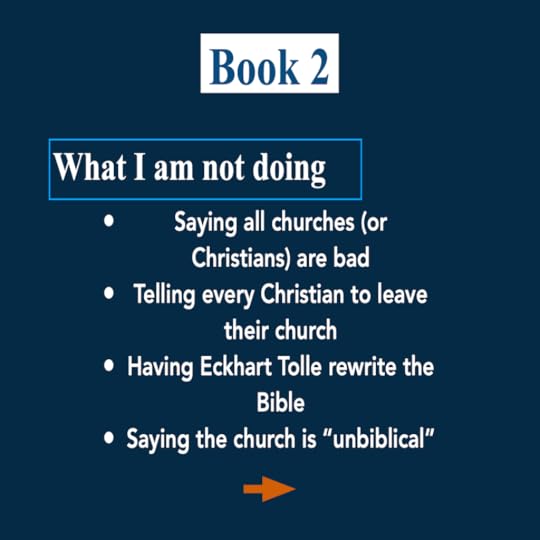
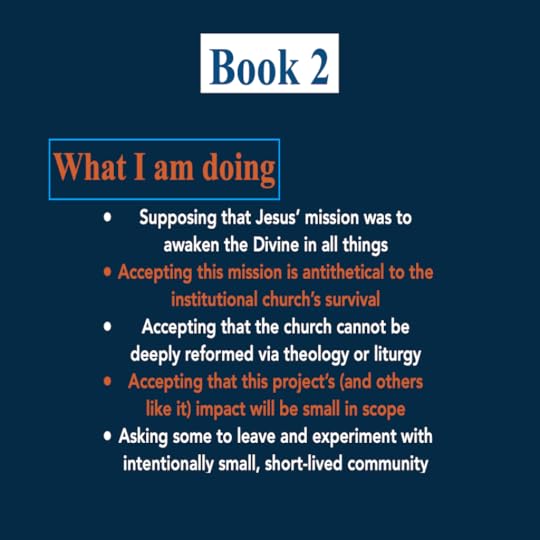
1. The result of this journey was my first book, Tracking Desire: A Memoir(ish) Walk Through Faith, Failure, and Finding God Under My Feet.
2. But they also sell booze because they’re edgy.
3. “Man’s last and highest parting occurs when, for God’s sake, he takes leave of god.” Meister Eckhart: A Modern Translation. 
December 24, 2020
Book Launch
Well, friends, the time has finally come.
On January 6, 2021, my first book, Tracking Desire: A Memoir(ish) Walk Through Faith, Failure, and Finding God Under My Feet will be officially released into the world.
I am utterly astounded by this moment, rendered speechless at the fruition of a decades’-long dream, and in light of that speechlessness, I will not spend many words here.
I want to let you know our plans leading to launch day.
My dearest wife and co-conspirator, Mikala (aka Smaug the Terrible), came up with a fantastic idea for preparing everyone to celebrate the day: that we should double down on the “church calendar” element of the project and use the traditional “Twelve Days of Christmas” as a springboard to launch. This means that the book will officially drop on January 6, also known as the Twelfth Day of Christmas, and more important to this, as Epiphany, or the day of unveilings.
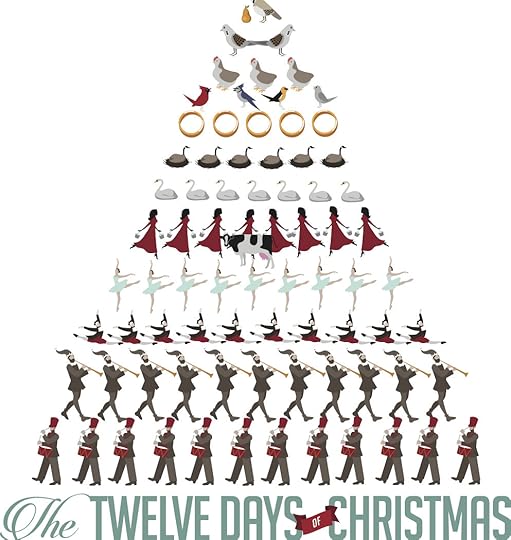
Beginning Christmas Day, Friday, December 25, and leading to the book’s unveiling on Wednesday, January 6, 2021, we will be filling the days with opportunities to interact with, learn about, and eventually, pre-order the book.
There will be interviews with family, friends, and writing colleagues and a podcast appearance. There will be revealings of art and readings from passages, and ultimately, there will be way too many entreaties for you to actually buy the damned thing.
So, be on the lookout starting Christmas Day for more!
October 26, 2020
Book Update
It’s been a few weeks since I last spoke about my upcoming book, Tracking Desire.
On September 22 (Hobbit Day!), the GoFundMe campaign officially ended (although the link will be live until publishing day, in case you would like to get in on the prize bundles) and I began the editing process in earnest.
When I began the campaign, summer was in full swing and I was in shorts, enjoying the balmy winds drifting lazily through the lush woods behind my house––and thinking my choice of whiskey as an accompanying drink to my live readings was a bad choice. Now, I sit at the writing desk in my typical winter ensemble of a cardigan, sweats, and slippers, the trees letting loose their amber leaves––and very much appreciating the way the whiskey warms my gullet on its way down.
As we move deeper into autumn, the self-imposed publishing deadline of “end of the year, hopefully by Christmas,” looms ever-larger, and I wanted to let you know where we stand on that goal.
I have two primary updates for the progress of the book:
First, the editing has been a deeply enjoyable, though arduous, process. I have been challenged not only to tighten up the prose where necessary, but to have been challenged to reassess several of the presuppositions I brought into this project almost three years ago. I believe the final result will ultimately be the best version of this book and my story that I could possibly offer at this stage of my life. That said, there is a possibility this task rounds the corner of the new year and requires a bit more time to be done right. I hope and believe it will not prove to be so, but I wanted to share the possibility.
Now, on to the exciting stuff.
I am giddy with dreams fulfilled as I can finally say words I’ve longed to be true: the cover for my first book is ready to be revealed!
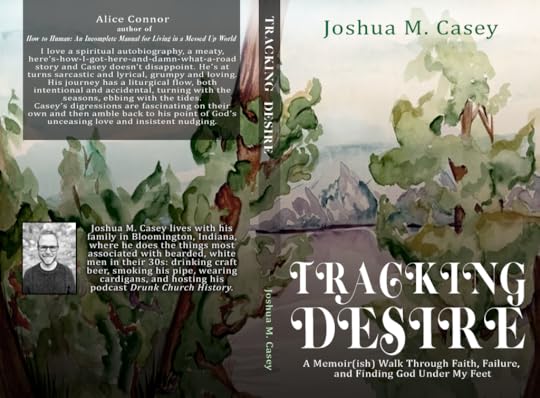
My new friend and fellow member of the Inglorious Pasterds Pub, Destiny West (check out her other stuff!), painted a stunning watercolor spreading across both the front and back of the book, and then finished it off with great design work to fit one of my endorsements and a tongue-in-cheek author bio (because I can’t take myself too seriously).
When we first discussed the cover, I spoke with Destiny about a passage in a semi-autobiographical short story by (of course) Tolkien, Leaf By Niggle:
It had begun with a leaf caught in the wind, and it became a tree; and the tree grew, sending out innumerable branches, and thrusting out the most fantastic roots. Strange birds came and settled on the twigs and had to be attended to. Then all round the Tree, and behind it, through the gaps in the leaves and boughs, a country began to open out; and there were glimpses of a forest marching over the land, and of mountains tipped with snow.
Tolkien, J.R.R.. Tales from the Perilous Realm (p. 286). Houghton Mifflin Harcourt. Kindle Edition.
For the main character, Niggle, this painting began as an individual leaf, but over time it “[sent] out innumerable branches, and [thrust] out the most fantastic roots”––an experience I have discovered in my own tale’s telling as it began with a single blog post about my ministry experience, an almost therapeutic exercise, which slowly found itself entwining with my whole life of love and devotion and failure and faith.
I, too, have been haunted by what lies beyond the edges of my story, the possibilities and potentialities, all leading to… well, something, I hope. Whether it’s the Great Mountain where the sun sets, or merely the next stop on the journey, I will not know until I arrive.
But then again, we never truly arrive, do we?
I hope this cover inspires you as much as me, and I especially hope it inspires you to read the book when it’s finished!
Thank you, again for your support and I look forward to finally releasing my story into the world.
September 13, 2020
Tracking Desire, the Playlist: Easter Vigil
Soon, the bells we had been given upon entering the sanctuary would be rang in joy when all of the lights were suddenly turned on and the organ would blast as all sang hallelujah. But first we must go through the long dark.
Easter Vigils stand out to me as moments of transition, when you look back on where you have come from and begin to actually hope that things may change.
Playlist can be heard via Apple Music and Spotify. Titles contain links to lyrics.
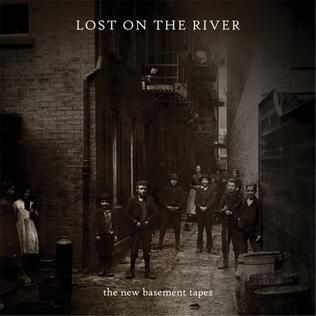
Kansas City | The New Basement Tapes
This song comes from a supergroup created in 2014 for the purpose of setting to music some unreleased lyrics from Bob Dylan‘s 1967 Basement Tapes sessions. The all-star lineup includes Elvis Costello, Marcus Mumford (who does the majority of the singing on this particular track), Rhiannon Giddens from the Carolina Chocolate Drops, Jim James of My Morning Jacket, and Taylor Goldsmith from Dawes.2These particular lyrics were written at a time in Dylan’s life when he had become a bona fide rockstar and the “voice of a generation,“ but felt pushed artistically in a new direction. Of the many new expectations was a loud desire from some of his original fans that he remain a simple folk singer. In fact, just a year before, Dylan had an iconic interaction with fans in London during his legendary “Royal Albert Hall” concert. 3So for the purposes of these lyrics (and particularly due to Mumford’s singing), I hear an intense desire to move forward, and yet feel the constraint of the past. For me, “Kansas City“ represents not only a lyrical metaphor of trying to go back to a simpler time, but an actual place, as that is the area to which we moved in order to get our lives back. As a location, Kansas City has always held a special place in my heart, though it was not until this time in my life that I actually lived close to the city.
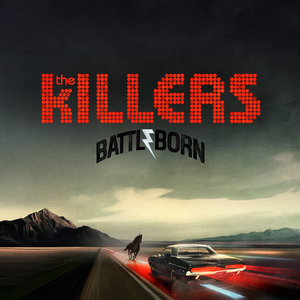
The Way It Was | The Killers
The Killers will always hold a special place in our marriage. On our honeymoon, I brought my iPod4 so we could have some groovy tunes while driving our rental car around Myrtle Beach (aka, the Branson of the East Coast). Our rental didn’t have an aux input so we had no way of playing said groovy tunes. So on Day One, we drove to a local record store and rummaged through the discount bins, coming across Hot Fuss. We played that album every day that week and our love for the band and its connection to the early days of our relationship were solidified.“The Way It Was” comes from a later album, Battle Born, in which lyrics such as “Somebody told me that you had a boyfriend, looks like a girlfriend that I had in February of last year,“ would be out of place. Instead, a matured Brandon Flowers is trying to deal with the ups and downs and difficulties of life, relationships, and the crashing down of quixotic dreams. The song covers the interior thoughts of a man driving onto a lonely stretch of desert road, thinking back on the past, wondering if I go on with you (by my side) can it be the way it was when we met?
Of course, nothing can ever simply go back, but we can at least seek to reclaim something from what we’ve lost. When the present is incredibly difficult, one thing we can do is reach back to the past and use it as a springboard for the future.
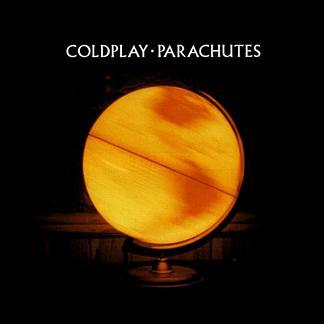
Everything’s Not Lost | Coldplay
Including the hidden track “Life Is For Living,“ this song closes out the first album from what would become one of the biggest bands in the world. I cannot quite decide if the lyrics are from Mikala to me, or me to her––or if we were at different times were saying it to each other.
“Everything’s Not Lost” mentions counting up my demons, realizing that some of them may actually have positive aspects that are worth carrying on into a new life, but the vast majority should be driven away. This song is a frank admittance of wrongdoing, an apology, and then a promise that everything is indeed not lost and that we still have a chance to start over.
As “Life Is For Living” says,
My head just aches when I think ofThe things that I shouldn't have done.But life is for living we all know,And I don't want to live it alone.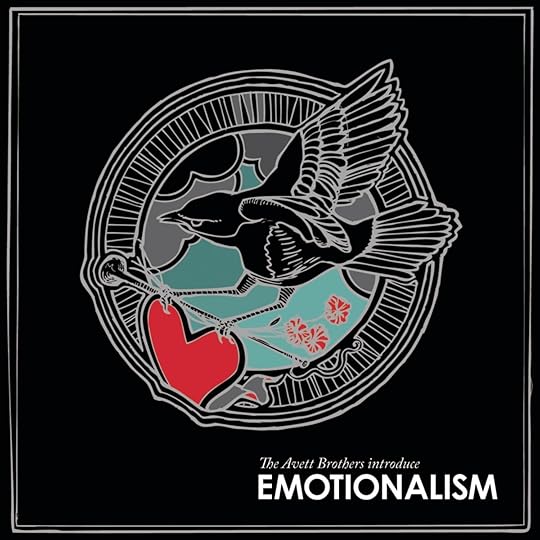
The Ballad of Love and Hate | Avett Brothers
One of my favorite story songs, I have seldom felt more seen than by the descriptions of the character Hate. In many ways, the first 3 to 4 years of our marriage was indeed a ballad of Love and Hate, one person seeking to create something beautiful and another seeking to ignore or destroy it.
After the two lovers are reunited, we close with Love cradling a weary, head hung down Hate in her arms, brushing off the failures of the past and simply reminding him of the solid things: I’m yours and that’s it, forever; you’re mine and that’s it, forever.
Of course in real life, there is a whole season of reconstruction following such a moment, but the coming together of Love and Hate to try to start over is a lived experience for me. If anything, I feel like Love here is too easy on Hate. My Enneagram 8 partner,5 was not quite so gentle, but it was also what I needed.Mikala would not have apologized for being gone for so long, and yet she also has been able to say in the years since that she grew from the experience––that the past is the past, though it has made us who we are in the present. In the end, Love and Hate came together and were able to start anew. We are each other‘s and that’s it, forever.
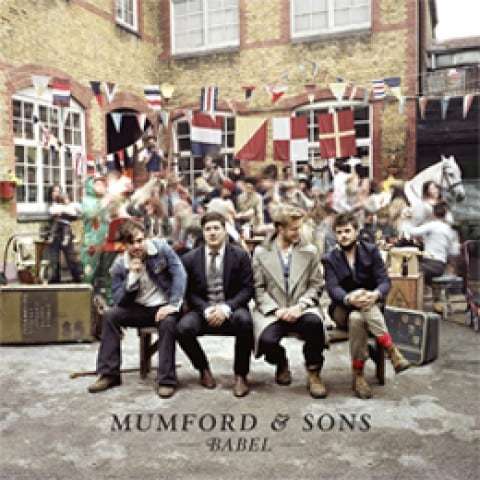
Holland Road | Mumford and Sons
Upon further research, this song was created as an expression of the artist’s relationship to the music industry and his own fans.
Thankfully, meaning is in the public domain.
For me, I cannot quite decide who is the “you“ being addressed here: is it the church? God? Mikala? All three at various points? Is it myself?
The singer realizes the effect of my shame has brought unnecessary pain, though he experiences the rebounding anger from those he hurt. The Holland Road seems to be a place, or a point in time, or an experience that one walks away from and yet never really leaves. We can pretend it’s in the past, but the gravity of that place always seeks to draw us back into its destructive center. As the singer says, So I hid my load, but little did I know that would not be the end of the Holland Road.
Ultimately, this is a song begging whomever is being spoken to to still believe in me––whether that be a partner, a calling, a God, or a self. As expected, the tune ends with a very classic Mumford and Sons mothafuckin-banjo-horn-blaring-put-your-hipster-hands-in-the-air anthem:
But I still believe,Through these cracks you'll see,When I'm on my knees I still believe.And when I hit the ground,Neither lost nor found,If you'll believe in me, I'll still believe.
The Devil You Know | Derek Webb
As I mentioned previously, this entire album speaks deeply to years covered in the main narrative of my book. So deeply does Webb’s art resonate with me that at one point I had every track sprinkled in the playlist. While there are other songs from it I prefer, this one expressed the season too well, particularly as a transition point into the awakening of Easter.
There eventually came a point when it was not Mikala waiting for me to return to her, but it was a legitimate request from me that she trust me once again.
According to phrases.org, “Better the devil you know than the devil you don’t,“ comes from a 16th century Irish proverb, and is typically used as a way to express the uncertainty of apparent greener pastures.6In this song, the singer recognizes that he was looking for something perfect, like pure joy, but now understands that good things and bad things always mingle, no stories are simple, landmines under feet.
Essentially, I knew I was asking for a huge amount of credulity and blind faith on my wife’s part so we could try this again, but it was the only way.
Thankfully, she was willing to trust the devil she knew.
1. I don’t have an “Easter Vigil” section in my book, but there are many songs to cover so I had to break them up somehow. 2. Oh yeah, and this particular track includes Johnny Depp on guitar, since he just happened to be in the area the day they were recording and I guess that’s a thing.
2. Oh yeah, and this particular track includes Johnny Depp on guitar, since he just happened to be in the area the day they were recording and I guess that’s a thing.
 3. Dylan was called “Judas” and he replied “I don’t believe you. You’re a liar.” Then he turned to his band and said, “Play it fuckin’ loud!” Also, for those who care, this concert was actually played in Manchester, not the RAH.
3. Dylan was called “Judas” and he replied “I don’t believe you. You’re a liar.” Then he turned to his band and said, “Play it fuckin’ loud!” Also, for those who care, this concert was actually played in Manchester, not the RAH.
 4. The white rectangle that had a click wheel on it
4. The white rectangle that had a click wheel on it
 5. You know, if you’re into astrology.
5. You know, if you’re into astrology.
 6. Or, as they’d say in Letterkenny, “Old boss is a dick till you meet the new one.“
6. Or, as they’d say in Letterkenny, “Old boss is a dick till you meet the new one.“

September 8, 2020
Tracking Desire, the Playlist: Holy Week
Just as in my book the feast days Epiphany and Pentecost receive their own portions of the narrative alongside traditional seasons, so does Holy Week. In the evangelical church of my youth, we rarely observed much of this week’s goings-on: occasionally we’d do something for Palm Sunday and of course, Good Friday was at least mentioned, but Maundy Thursday (the Last Supper, when Christ washed the disciples’ feet) or Holy Saturday (his full day and night in the tomb) were almost universally ignored or merely wrapped into Easter.
As I became aware of liturgy and saw how these moments of Jesus’s life were handled in other traditions, I came to see this week as a magnification of the “bright sadness” of Lent. In this short period, the Christian takes the themes meditated upon during the previous thirty-three-odd days and highlights each in turn. My song selection does much the same.
Playlist can be heard via Apple Music and Spotify. Titles contain links to lyrics.
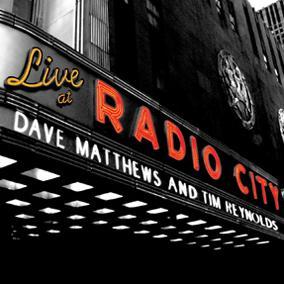
Stay Or Leave | Dave Matthews
Dave Matthews’s, “Stay or Leave” is a look back on a relationship that has run its course. As it progresses, you understand it is in fact the very day he’s been left––what day is this, besides the day you left me?––and he stands amidst the memories of their love, asking the perennial question, did I do all that I could, that I should’ve done?
During this broken period of my own story, I believed I deserved to be left (and for a time, Mikala seriously, and understandably, considered it), but somehow, through some sort of deeper magic than we possessed, the question of whether to stay or leave was decided in a different way than this singer’s experience.
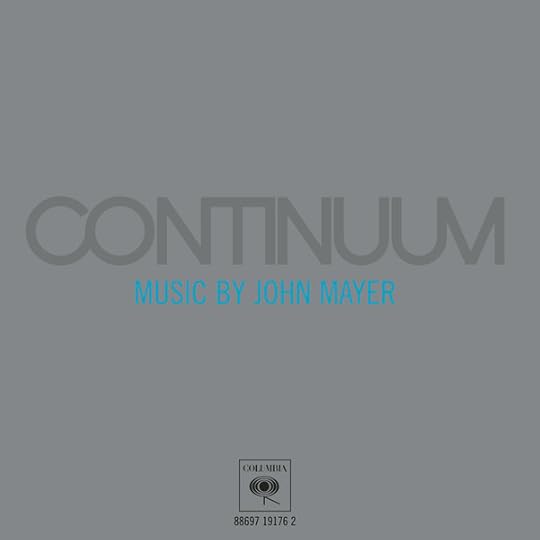
Slow Dancing In A Burning Room | John Mayer
Continuing the theme of what by all accounts should have been a broken marriage, we turn to my favorite song in what is easily a top-three album for me. The lyrics and music mesh perfectly to create an unparalleled emotional charge, describing the paradoxical sense of listless desperation as a doomed couple plays out the already-foreseen failing of their relationship.
The central lyrical image is deeply evocative: a couple dances slowly––are they enjoying one last moment of intimacy or are they running on passionless fumes?––as the room in which they stand, their relationship, slowly burns down around them. One knows with certainty that they’re going down, doomed, even going so far as to say that whatever particular fight they’re currently having is not a silly little moment, but is the deep and dying breath of this love that we’ve been working on.
Again, during the long months in which my illegitimate relationship was ended (mostly) but I still couldn’t bring myself to love the one to whom I’d committed my life, I felt this scenario deeply. I truly believed that we were slow dancing in a burning room, just waiting for it all to crash down around us.
The fact that it did not actually die, that it actually grew and turned into something new and vibrant, was beyond my ability to conceive at that time––but I am forever amazed and grateful that it did.
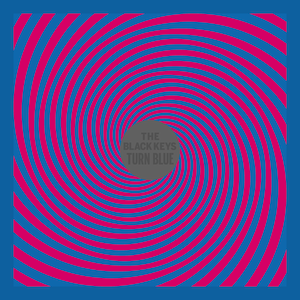
Weight of Love | The Black Keys
I mostly chose this song for the title and musical continuity between it and “Slow Dancing In A Burning Room”.
Love is indeed a weighty thing. Whether it lights up or burns out, it contains enough energy to consume entire lives. Falling in love is not for the faint of heart, and choosing to remain is difficult even in the best of circumstances, much less when such tremendous energy and power is turned against you.
On one hand, the song isn’t best understood from my side, as the lyrics are from the perspective of the jilted lover, rather than the… jilter(?), but I, too, know the feeling that your partner is losing strength, giving themself away to the weight of love.
Also, the guitar solo at the end is just fucking incredible.

Stop Listening | Derek Webb
Oh man, this song. This album.
I remember when Derek came on my friends’ podcast, The Inglorious Pasterds, and discussed the lyrics and stories behind many of these songs. From the first listen, I was hooked. In Fingers Crossed, Webb speaks of his estrangement from God, the Church, and his family. He speaks candidly about betraying his wife and how a part of him desperately wants to go back and choose better––and yet there’s another, subtler strain in there, holding out promise for a new beginning if he can make it through.
“Stop Listening” opens the album with a conversation between Derek and the faith community in which he’d previously found a family and a career. The first verse is essentially a disclaimer, letting the audience know that what they’re about to hear will be difficult and, if they are not ready to hear his uncensored thoughts about God, life, love, and everything in between, they are free to stop listening, in fact if they do, he affirms that we can still be friends.
Derek (and I) have been told at various points that the doors of Christian community are always wide open for us . . . provided we remain penitent and obedient, provided we don’t climb down from the cross. We’ve been told that if we stop listening now, it will simply affirm their own rightness. They’ll piously pray for our recalcitrance, but they can’t dig in with us, much less empathize––above all else, they must remain aloof from the failure, so that if we don’t agree they can wash their hands of us: in the end we’ll grieve a brother lost.
In a stroke of lyrical brilliance (or more likely, from personal experience), Webb’s interlocutors use his own previous song against him as a cudgel––as well as the current song––finally saying they will leave the moment he stops listening to them.
But for those who go forward, he admits his own insufficiency, if your eyes can see what’s killing me, I’ll need you by the end and even ends the song with hope that if we can get through this, we may have a shot at something even we can’t tear apart.
So we may be, ever so slightly, turning toward a brighter day.
Man, this song. This album.
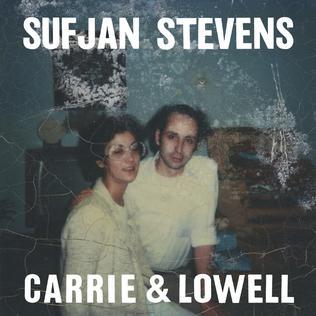
Should Have Known Better | Sufjan Stevens
Yet another example of stealing lyrics meant for something else. The entirety of Carrie and Lowell is Stevens working through his childhood after the death of his estranged mother. He has spoken of his depression, of the feeling that his relational might-have-beens were haunting him, leading to every conceivable self-destructive act––all in the pursuit of . . . what? Absolution? Connection?
I know the distance from the world and those you love, as though my black shroud were holding down my feelings. I know the frustrated helplessness of seeing the effects your depression, delusion, and destructive tendencies have on those around you––of only wanting to be a relief.
Basically, the magnification of my failure and brokenness during Holy Week led to many dark nights of waiting for the remedy, thinking all I might or could have done, but always saying helplessly I should’ve known better.
September 1, 2020
Tracking Desire, the Playlist: Holy Lent
I’ve spent a great deal of time discussing the season of Lent, on my blog, as a campus pastor, and even for my friends’ podcast,1 so I was somewhat surprised as this part of the playlist took shape.
I honestly didn’t know what to expect: whether it would be full of spiritual songs about the purifying, humility-inducing experience of suffering; or if I would stick entirely to tragic love songs as this period of the narrative covers my own failures in that arena; or if maybe it would speak of the simple anger that comes from seasons of confusion and darkness.
In the end, I sort-of got all three.
Playlist can be heard via Apple Music and Spotify. Titles contain links to lyrics.
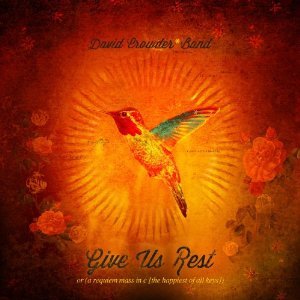
Oh Great God, Give Us Rest | David Crowder*Band
One of my favorite tracks from a favorite band of yesteryear. I still remember getting the email announcing they would be releasing one more album and then disbanding. They weren’t even going to tour in support of the work. It would simply be released and then . . . David Crowder*Band would go away.
So much goes into this song’s meaning for me and its placement as the first track in the Lenten portion of the list.
First, the disbanding of my favorite band was a personal blow. Not only did they put on a fantastic show, but their albums were just about the only Christian music I was able to stomach at the time (or that I was willing to lead as a worship pastor). Their disappearance created much more of an internal crisis than I’m comfortable admitting.
Secondly, the lyrics themselves speak of being worn thin from all of this. It’s a simple plea for God’s light to break through the darkness so often obscuring anything good in this world. I also appreciate that the lyrics take responsibility for the ills of the world—well I’ve done my part, too, well I guess––and that feeling of being irreparably warped—a crooked heart twisted up like mine—many of us feel (especially coming from the evangelical purity culture).
It, like so many songs I led as a worship pastor, is a simple plea for light in a life that too often feels dark beyond hope. A fitting entrance into the “bright sadness” of Lent.
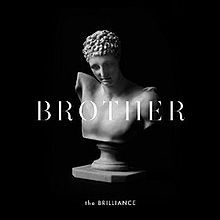
Dust We Are And Shall Return | The Brilliance
These words are taken nearly verbatim from the Ash Wednesday liturgy during the imposition of ashes—one of the most deeply moving moments in any church experience.
It was certainly a meaningful moment for me, personally, to have the ashes of last year’s celebration placed on my forehead and to think on mortality and my smallness in all the vast cosmos, but it is even more compelling to watch these same ashes be put upon your spouse’s forehead, and then your children’s.
As a naturally melancholy person, considering my mortality is nothing new to me. However, it is another thing entirely to look upon the faces of the innocents to whom I have helped give life—those for whom I would gladly die—and recognize that they, too, will once again return to dust.
In that vein, I have always understood the call to give glory to God as less thanking the Divine for death, but rather accepting the cycle of life for what it is, and that our willing participation in life and death––receiving the gift for as long as we have it, and then offering it back up––puts us in harmony with all things.
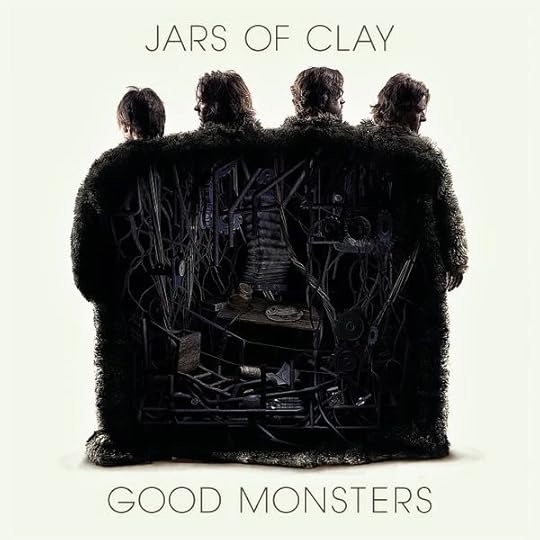
Oh My God | Jars of Clay
Even as a youth, I gladly received the knowledge that it was okay for humans to cry out to God in anger—the psalmists, as well as many of the prophets, did as much—but I always heard it more in the line of a tantrum that would soon abate. The puny human would say angry things to God, then God would fix everything, and the human would apologize, praising the deliverance.
But that is woefully inadequate to our needs (and a poor interpretation to boot).
When dashed against the hard rocks of the world, forced to weather the suffering of so many people, the logical response is to cry out in anger, to storm and rage against the cruel, needless pain felt by all in small and great, heart-rending ways; it is to, above all else, to cry out.
Perhaps no song better encapsulates this cry in all its anguish and confusion than, “Oh My God,” taken from one of the best albums by another one of my favorite bands from way back. This deeply unsettling song begins musically quite simple and lyrically broad. However, about halfway through, lead singer Dan Haseltine quits with the metaphors and begins to bluntly list all of the people who, for various reasons, say, “Oh my god”—from liars and fools, to fearful mothers and saviors.
But then comes the build.
The music swells and the plangent cries of all that is broken and bent in this world are spoken with increasing volume and speed, as though listing the charges brought against God (and yet, there is also a recognition that we are the ones whose choices make this world possible), finally coming to the open-ended deceptive cadence as the vocals scream out the heart-stopping cry, oh my god! Oh my god! Oh my god!
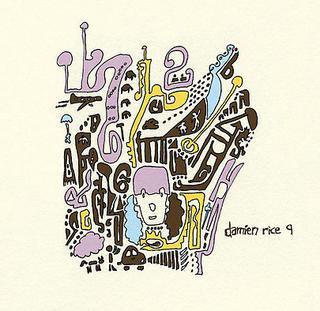
Rootless Tree | Damien Rice
This song is likely the most lyrically difficult for some to swallow, as the chorus begins with an angry cry of fuck you!––but I believe it is an important element of the Lenten experience.
Damien Rice (who will reappear later in this post) is himself processing the breaking of past relationships in which he once felt secure and, while I am directing the anger towards God in my reading, it is the rawness I so appreciate.
Because sometimes God is a dick.
Sometimes, life is simply too much for us, and all we want is for the Divine (or those claiming to represent it) to just leave us the fuck alone because it’s quite frankly hell when you’re around. So, as the weight of life leans heavily against us like a rootless tree, not letting us move on, we just need to be angry and let it out.
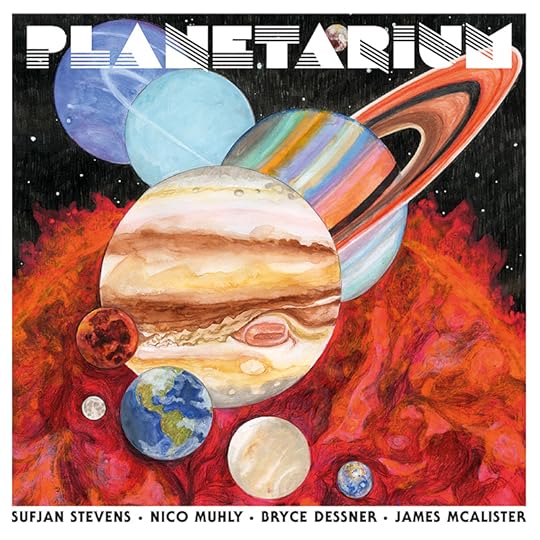
Venus | Planetarium
Following “Rootless Tree’s” sharp turn, we’ll continue veering off the spiritual track we were on with the beginning of this season. On “Venus”, Sufjan Stevens and company2 sing an erotic homage to sexuality and the Greek goddess typically associated with such desires.
As this portion of the narrative covers my own inconstancy, it seemed this tune wrestling with the goddess of love—who on more than one occasion, casts spells of amorous desire on hapless mortals—fit well. When one looks back on such episodes of their lives, it’s typical to wonder what in the world you were thinking and doing and, without relinquishing the blame, still wonder if you were somehow bewitched.
(Also, this song uses “callipygian,” a word attributed to Aphrodite and literally meaning “the one with the nice ass.”)

Do I Wanna Know? | Arctic Monkeys
The lead song from one of my favorite albums, “Do I Wanna Know?” opens the general theme of obsessive, uncertain love that runs throughout AM.
This song is just cool, with its slow, driving beat and simple, badass guitar––is about as sexy a tune rock can make. …but it also speaks to my experience, that thudding, metronomic desire tinged with dark forbiddenness.
In my moments of deepest obsession and illegitimate love, I know the inner conflict of wanting so badly to know whether feelings are reciprocated while not daring (in my case, for really good reasons) to ask.
Until I did.
Then I know the loneliness pushing me from what is known to that which is (rightly) forbidden––then the lowering of inhibitions, and the obsessive thinking about calling when you’ve had a few.
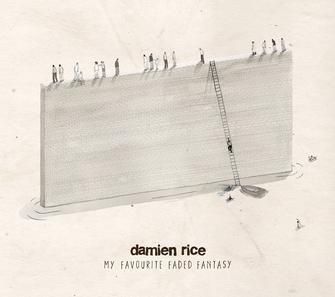
My Favorite Faded Fantasy | Damien Rice
Another Damien Rice tune,3 this title track to his third and long-awaited return to music opens the album theme of recognizing and in some way “honoring” past love for what it is, then trying to move on.
I found the first step of moving on was to honor the love––wrong and inappropriate though it was. Without allowing the moment of grief and acceptance of what was and what could no longer be, I would simply remain in a perpetual state of tragic pining after fantasy. Thankfully, Mikala patiently waited for me to move on, trusting I would someday turn to her.4
And so I let the fantasy work its way out, first allowing myself to believe this person would be my favorite taste, face, name, place . . . then realizing they were in fact my favorite fantasy––accepting that the image I had built up, the future I had built in my head were in fact based on pure imagination, fantasy.
Then, honoring the experience and the feelings, I had to let it fade.
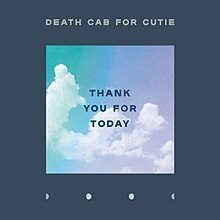
Autumn Love | Death Cab For Cutie
I mean, you can’t have a playlist with a section dedicated to whiny, lost love without Death Cab can you?
The title of the song immediately attracted me as autumn is my favorite season, but I won’t burden you with metaphors heaped in piles of gold and red, radiating the intoxicating scent of endings and entranced failings carried on the coming wind of winter’s biting chill (Sorry, couldn’t help myself). This particular season of the year was for a time intimately connected to this season of life, not only because it was when everything began, but because the feeling “in the air” as it were, was felt internally.
Yet this time, like autumn, did not last forever. I remember when I finally could step out on a beautiful fall day, breathe deeply, and not be reminded of my favorite fantasy. At some point, I realized this love so infused with the tragic beauty of autumn would simply not be enough, and when I finally felt the truth of that statement, I allowed the past to fall like so many brightly colored leaves, and remain fallen.
1.These recordings currently only available on their Patreon feed.
2. Including Bryce Dessner of The National
3. Strangely, neither of his songs I’ve selected come from his first multi-platinum selling album, O.
4. “Thankfully” may be the understatement of the year. It’s a goddamn miracle––a move of superhuman hope and love.
August 25, 2020
Tracking Desire, the Playlist: Advent, Christmastide, and Epiphany
In preparation for the conclusion of my publishing fundraiser, I created a playlist of songs that cover the narrative movement of my book and will be releasing blogs offering commentary and context until the campaign ends on September 22.
So without further ado, let’s begin with the winter seasons: Advent, Christmastide, and Epiphany. (Titles contain links to lyrics)
Playlist can be heard via Apple Music and Spotify.
[image error]Mercury and Lightning | John Mark McMillan
The title track from his 2017 album about searching for faith after faith, “Mercury and Lightning” speaks of the relentless pursuit for God. As ungraspable as quicksilver, God’s revelations appear and disappear into the night like lightning—leaving our eyes imprinted with a shadow of light crackling across a darkened sky.
Frustrated in the hope for Divine encounter (and later, for success), McMillan feels as though he needs either a new religion, or a new lie to quiet the questions keeping him up at night.
The chorus speaks of the haunting echoes of God’s presence that have dimly reverberated in my heart all my life and serves as the opening epigraph to Part I: Adventus, in Tracking Desire:
I swear I’ve heard the echoes of a voiceLike a dream that you feel, but you don’t remember
I’ve known it ever since I was a boy
Like a word on the tip of my tongue
There’s a reason he’s the only “Christian” artist I still listen to.
[image error]I Still Haven’t Found What I’m Looking For | U2
I don’t much go in for astrology, but as an Enneagram 4,1 there may not be a more on-point song. Honestly, it’s so obvious as to be almost on the nose, so I debated including it, but here it is…
This is first U2 tune I remember hearing (on my mom’s Runaway Bride soundtrack to be exact), and Bono’s rasping, plaintive cry captured me immediately. How did he know what I’m always feeling? I wondered.
In keeping with Advent’s theme of unfulfilled, yet expectant hope, the singer recognizes—through several biblical allusions—that he believes in a God who will break humanity’s bonds of disunity and who, personally, freed him and carried the burden of his shame.
And yet . . .
And yet, he still hasn’t found what he’s looking for.
But maybe someday.
[image error]Hunger | Florence + The Machine
I’m embarrassed at the limited number of women-led songs on this playlist (and in my general rotation until recently), but I can say that the ones on there pack a punch—much like the vocals of this song.
Lead singer Florence Welch is a waifish woman with a voice many times too big for her. As she sings “Hunger”, the listener is drawn into her longing through the sheer gravitational force of the vocals. You are immediately thrown into the deep end when the first lines reference the eating disorder which she began battling in her late teens, though the idea of forced hunger is turned on its head as almost (though not quite) preferable to the indefinable, gnawing emptiness of being lonely.
She goes on to mention other attempts to feed this beast, all to no avail. There is fear of ongoing rejection, but the faltering commitment to continue searching. In the end, Florence finds companionship with one who does not try to force the answers, but simply sits with her in the midst of the unknowable, ever-present hunger.
[image error]Perth | Bon Iver
Following the largeness of “Hunger” was going to be a difficult task, but the opening track to Bon Iver’s self titled album2 begins with an expansive song opening the work’s general theme of place-memory. As with most of Bon Iver’s stuff, there’s a Grand Canyon scale of layers—musical and lyric—to work through.
“Perth” is based on a seemingly random encounter between frontman Justin Vernon and music video director, Matt Amato. During the three days of filming, Amato’s childhood friend and worldwide movie star, Heath Ledger, died. Though ostensibly together to shoot a music video, Vernon found himself the recipient of Amato’s memories with Ledger growing up in Perth, Australia. At times, he simply held the bereaved as he wept over the sudden, unexpected loss.
As I describe in the opening chapter of Part I (and read aloud in the first live advance reading), my father died when I was only seven years old and this event, as you would expect, left an indelible impression on my young mind—one I had not allowed myself to process until very recently.
Part of writing this book has been to, as the song says, “rid all my stories,” to “break my ground” and allow myself the compassion to grieve, and then to live on, my father’s memory growing and changing as I live on.
[image error]The Fear | Ben Howard
Fitting in well as a transition between the expectancy of Advent and the burning brightness of Epiphany is the dark mystery of Christmastide, when we wonder if something so small can stem the tide of so much evil and pain.
We all feel too small and unequal to the task of life (just a blade in the grass, a spoke unto the wheel), but deep down, we know that if we do not step out, we will fulfill that fearful prophecy of letting it simply flow by. “Even the smallest person can change the course of the future,” as Galadriel says.
Howard discusses his fear that not only will his sins and proclivities someday catch him up (I will become what I deserve), but also speaks aloud the inner thoughts of many young people, fearful of their lives simply passing them by:
I’ve been worriedThat my time is a little unclear
I’ve been worried
That I’m losing the ones I hold dear
I’ve been worried
That we all
Live our lives
In the confines of fear[image error]
In The Blood | John Mayer
Speaking of fear, this song pretty well sums up the nagging worry that we are doomed to repeat the mistakes and failures of our family. How much of who we become is due to nature, nurture, or the force of our free will to break from the orbits of those we love but do not always want to imitate?
Mayer recognizes the sort of man––of love––he wants and needs to both give and receive, yet knows that without a massive effort, he will continue to repeat the (in his case, widely publicized) mistakes of his life and relationships.
I know deeply this desire to be different, to break away from the failures of my forebears and the conventions of my upbringing (especially faith traditions) without losing the relationships attached to these things, but the execution is difficult. This ultimately leads to the unanswered question: will it wash out in the water, or is it always in the blood?
[image error]You Don’t Know How It Feels | Tom Petty
Though I would never speak ill of the legendary Tom Petty, I chose this song because of its (yet again) almost on-the-nose explanation of my internal monologue. There are other things going on in this song than what I’m highlighting here, but for me, this tune simply reminds people that I’m dreadfully, tragically unique (*insert eye roll here*) and that they cannot possibly know what it’s like in my head.
Also, Wildflowers is a damn near perfect album and came out in 1994, the year my mom remarried and I was given a new father. My dad and I are incredibly different from each other, so it would make him laugh to hear me say, as if from a cue card, you don’t know how it feels to be meeee.
[image error]Ends of the Earth | Lord Huron
It’s tough to follow Petty, so I kept with the semi-country/folk feel, but needed to widen the aperture from the more immature feelings of feeling misunderstood. The first time I encountered Lord Huron was through this song as it played over the emotional series finale to one of my favorite shows, Community. The scene this song accompanies shows the final breaking up of a group of friends—two in particular3—who met in community college and became a family over the course of their time together.
Right before this scene, the group broke the fourth wall (as they were wont to do) and discussed what their ideal seventh season would entail. As each character creates and populates a world without all of their closest friends involved, there is a sort of catharsis given to the ending of a journey and the beginning of something new and unknown.
Similarly, “Ends of the Earth” encapsulates a totally fictional narrative, as the band went to great lengths to create an entire world about which they could sing.
In this song, the main character (known as Lord Huron) is ready to set out on an adventure into the wide unknown, but begs his love, Helen, to accompany him. The wanderlust is upon him and even love cannot hold him down––he must strike while the desire is hot and his body is still young enough to answer the call: No time for ponderin’ why I’m a-wanderin’, not while we’re both still alive.
He wants nothing more than for her to partner in the journey, but the chorus begs the question4 to the ends of the earth would you follow me? It appears by the end of the song that he sets out alone, but the question has been asked, and I felt it reverberate in my own heart as in this season of my life, I took the first tentative steps away from the life-track and traditions of my youth.
[image error]Awakening | Switchfoot
That’s right, chumps, we’re getting another semi-Christian band!
These dreams started singing to me out of nowhereAnd in all my life
I don’t know that I ever felt so alive
The album Oh! Gravity is really the last one I paid attention to from these California rockers, though admittedly, I had no reason to stop listening: I loved everything before and this one became more beloved as time went. (In fact, there will be another song from this collection before the end.)
The desperate crying out for an awakening, a breaking out of the apathy and old ways into something fresh and dynamic, is the longing of many a young person, and I was no different. During this epiphanic season of growth and new experiences, I felt myself coming spiritually alive in a way I had not known was possible.
The cry was answered in my heart and, for a flashing moment, I felt what had always been described by others claiming to intimately experience God. Of course, the feeling and its effects were not to last, but that’s for the next post.
2. Even that has multiple layers. Technically, the work is called Bon Iver, Bon Iver, in keeping with the all-important comma in each album title, leading to the 2019 release, i,i (or i comma i).
3. Annie and Jeff are obviously in love but the show runners wisely withheld the easy satisfaction of their getting together, ending ultimately with a kiss and a goodbye.
4. I hope you’re seeing how many of these songs ask questions with no definitive answers.
August 22, 2020
Tracking Desire, the Playlist
We’re moving ever closer to finishing the work on my first book, Tracking Desire: A Memoir(ish) Walk Through Faith, Failure, and Finding God Under My Feet, so an end date for the GoFundMe has been set. The full manuscript is with an editor, we’re getting closer to settling on a cover design, and have already raised enough money to cover the initial expenses. Now it’s time to finish the job!
One month from now, on September 22, 2020 I will close the books on the campaign to crowdfund my first publishing venture.
To let you in on my private nerd joke, this date is also known as “Hobbit Day” as it’s the birthday of both Bilbo and Frodo Baggins and seems as good a time as any to end the preparation for a journey and begin it in earnest.
[image error]I don’t know half of you half as well as I should like, and I like less than half of you half as well as you deserve.In support of the final weeks of fundraising, I wanted to present what has come to be an audio accompaniment to my story. Several weeks ago, I began a playlist of songs that were meaningful to me and could be arranged in such a way as to share the broad narrative of the book.
What initially resulted was a 12+ hour playlist that was, mercifully for you and mercilessly for me, whittled down to 4.5 hours.
So, in the following weeks, I will present and discuss the songs in the playlist (which can be found both on Apple Music and Spotify), explaining what their music and messages convey to me and how they are used, inspired by, or resonate with the book.
Even as a child, creating a playlist was an important activity. A delicate balance must be struck between the music itself––from genre and era, to tempo and feel––and the lyrics. Going lyrics-heavy will typically lead to a ponderous, even laborious listening experience, while only focusing on the music will link songs that do not belong anywhere near each other.
Basically, just watch High Fidelity and you’ll get it.
Armed with my dual cassette boombox and a stack of blank tapes, I listened to favorite tunes, trying to match one’s ending with the appropriate follow up. I added up track lengths, created two second bumpers, and listened as one favorite song was grafted into a new context for future enjoyment.
When Mikala and I began dating, I had moved onto ripping playlists from iTunes to CDs, and throughout our long-distance relationship, would send her a new album of love songs every month. When she confessed that music didn’t often convey the lyrics to her immediately, I wrote them into embarrassingly sappy love notes, hoping she would read into the poetry written by another of the growing love I felt for her.
Over time, I curated fewer of these playlists, content instead to craft ad hoc song lineups, but the impulse never fully departed.
Now, as I have moved into the back half of this process, I wanted to create something that would tell my story in a different way. Not only do I hope this will create excitement for where the story goes, but I can say personally, the linking together of these songs has opened new resonances of my own story for me (but that’s for another post)
As the book itself is broken into parts based on the Church Calendar, the songs will be presented in these as well, though seasons will often be combined or separated, as the case may be, as they are less cleanly divided than the stories in the narrative itself.
So, in the meantime, enjoy the playlist, be on the lookout for the first set of songs and commentary, and share and donate to my campaign before it ends!



